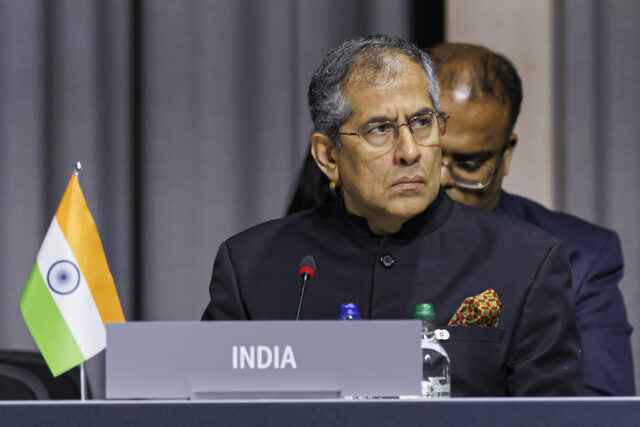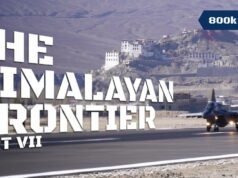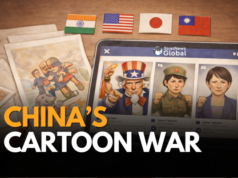India at Ukraine Peace Summit
India took part in the Summit on Peace in Ukraine organised by Switzerland over the weekend. But did not “associate” itself with the joint communique, along with several countries. Pavan Kapoor, Secretary (West) in the Ministry of External Affairs represented India at the two-day meeting. He explained India’s position. “Our participation in this Summit and continued engagement with all stakeholders is to understand different perspectives, approaches and options.” This he said is, “‘to find a way forward for a sustainable resolution of the conflict. In our view, only those options acceptable to both parties can lead to abiding peace. In line with this approach, we have decided to avoid association with the joint communique. Or any other document emerging from this Summit.”
India took the decision that neither Prime Minister Narendra Modi nor External Affairs Minister Dr S. Jaishanker would attend the Swiss Summit after the G-7 meeting in Italy. On participation, Secretary Kapoor said, “We deem it important to join this gathering that seeks to explore the way forward to a negotiated settlement. He noted it is, “a very complex and pressing issue. India shares the global concern over the situation. And supports any collective desire to facilitate a peaceful resolution of the conflict.”
“India’s participation in the Summit as well as in the preceding National Security Advisor political director-level meetings based on Ukraine’s peace formula is in line with our clear and consistent approach. That enduring peace can be achieved only through dialogue and diplomacy,” he added, saying, “We continue to believe that such a peace requires bringing together all stakeholders. And a sincere and practical engagement between the two parties to the conflict. Accordingly, we will continue to engage with all stakeholders. As well as the two parties to the conflict, to contribute to all earnest efforts to achieve lasting peace in Ukraine.” Ambassador Kapoor served as India’s last envoy to Russia before he took over his current position in the MEA in Delhi.
The Swiss Government reported 92 countries participated, with heads of state and government representing 57 of them. 8 organisations also attended. The UN was an observer. India, Saudi Arabia, South Africa, Thailand, Indonesia, Mexico and the UAE were among those that did not sign the communique. Brazil as an observer, didn’t either.
Russia did not take part in the Summit. The organizers said they did not send an invite because Moscow indicated it wouldn’t participate. On the eve of the Summit, Russian President Vladimir Putin reiterated his offer of a ‘peace plan’. He said Moscow would “immediately issue an order to cease fire and start talks”. But, only if Ukraine fully withdrew troops from the Russian-seized Republics of Donetsk and Lugansk and the Kherson and Zaporozhye regions. As well as officially state its plans not to join NATO. Kyiv described the plan as “absurd”, saying it amounted to “surrender”.
U.S. National Security Advisor (NSA) Jake Sullivan also dismissed Putin’s proposal as unreasonable. He said, “Not only does Ukraine have to give up the territory that Russia currently occupies. But Ukraine has to leave additional sovereign Ukrainian territory,” Sullivan told leaders at the Swiss resort of Büergenstock. He also said China not attending was probably a result of Moscow’s entreaties. Ukrainian President Volodymyr Zelenskyy also told China to communicate its peace proposals on ending the war directly, instead of doing so via media outlets.
Both Sullivan and Deputy Secretary of State Kurt Campbell plan to be in Delhi next week to continue the high-level India-U.S. dialogue. They will undoubtedly also exchange views on the Ukraine war in meetings with Indian NSA Ajit Doval and other officials.
The Joint Communique at the Swiss Summit said there was a “common vision on the following crucial aspects:
“Firstly, any use of nuclear energy and nuclear installations must be safe, secured, safe-guarded and environmentally sound. Any threat or use of nuclear weapons in the context of the ongoing war against Ukraine is inadmissible. Secondly, global food security depends on uninterrupted manufacturing and supply of food products. In this regard, free, full and safe commercial navigation, as well as access to sea ports in the Black and Azov Seas, are critical. Attacks on merchant ships in ports and along the entire route, as well as against civilian ports and civilian port infrastructure, are unacceptable.
Food security must not be weaponized in any way. Ukrainian agricultural products should be securely and freely provided to interested third countries. Thirdly, all prisoners of war must be released by complete exchange. All deported and unlawfully displaced Ukrainian children, and all other Ukrainian civilians who were unlawfully detained, must be returned to Ukraine.”
The 'Eye' of the story not the 'I' of the story. That's Amitabh Pashupati Revi's credo from the beginning of his professional journey in 1995. From conflicts in the war zones of Afghanistan, Syria, and Iraq to nuances of international politics in the Maldives,Thailand, and South Sudan, Amitabh has reported from all the world's continents, except for Antarctica(so far). Though, he has documented the world's third pole, the Siachen Glacier!
Amitabh reports and produces documentaries on the two-front China-Pakistan threat to India. His ground reports from Arunachal Pradesh and Ladakh have received viewership in the hundreds of thousands. Amitabh has interviewed world leaders, top global analysts, and experts in India, Russia, the United States, and Australia as well. Along the way, he’s picked up the Russian language, the Ramnath Goenka Award for his reporting on the 'Islamic State' terrorist group in Iraq, the Khaled Alkhateb Award for his reporting from Palmyra, Syria, and the UN Dag Hammarskjöld Distinguished Journalist Fellowship. Last but not least, as a founder member of StratNews Global, Amitabh helps lead the reporting, editorial, production, and administration teams at StratNews Global, BharatShakti, and InterStellar on their journey ahead.





